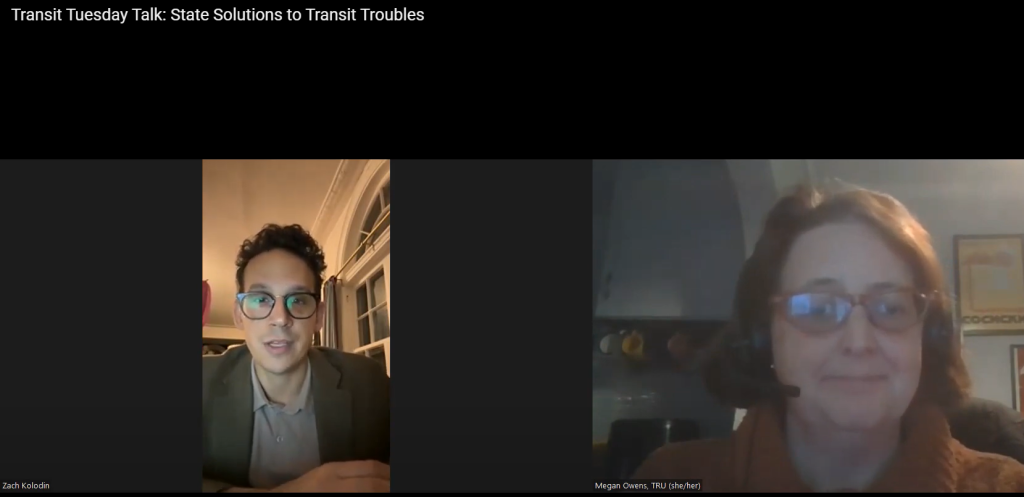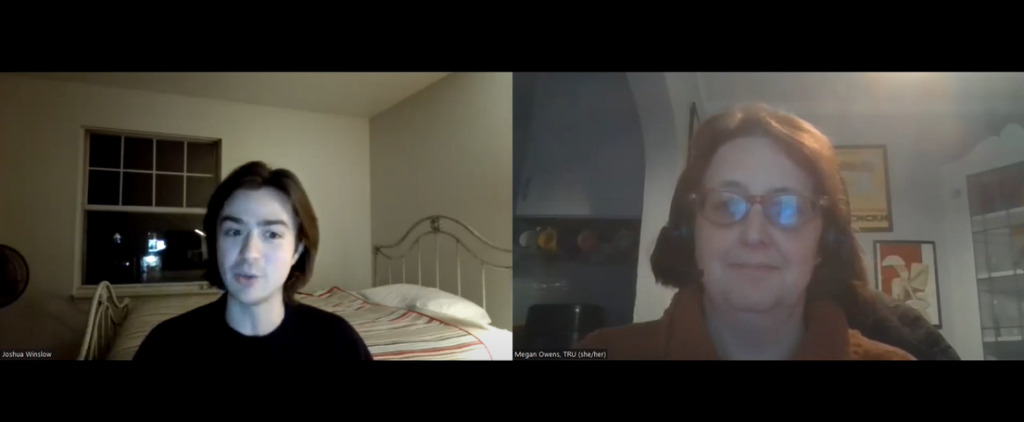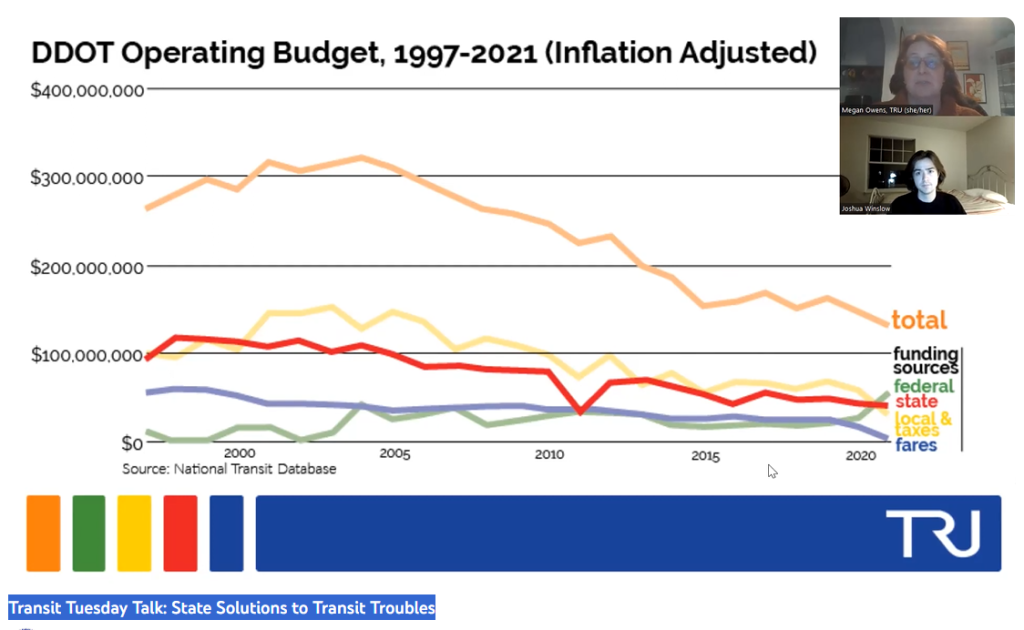TRU’s monthly lecture series, Transit Tuesday Talks, returned on Nov. 14 to discuss the State of Michigan’s policies on public transit and urban planning, how those policies are currently affecting Detroit area commuters, and what needs to be done to make sure that Michigan’s transit infrastructure will once again become world class.
Zach Kolodin, the state’s Chief Infrastructure Officer, and Joshua Winslow, constituent services director for State Rep. Jason Morgan (D, MI-23), joined TRU executive director Megan Owens through a virtual forum to discuss their roles in the state’s transit policy. Michigan House Transit Appropriations chair Ranjeev Puri (D, MI-24) was scheduled to speak, but was unable to attend at the last minute.
Watch the full video on YouTube.com/DetroitTransit.
Zach Kolodin, Chief Infrastructure Officer for Michigan

Kolodin has served since 2022 as Chief Infrastructure Officer to Governor Gretchen Whitmer and as director of the Michigan Infrastructure Office. He says the position was created to coordinate the implementation of the federal Bipartisan Infrastructure Law, which acts as both a coordinator and as a capacity-builder for the state. The infrastructure office chairs a special infrastructure subcabinet composed of relevant department heads and works closely with the state’s several metropolitan planning organizations.
In regards to transit, Kolodin says that the infrastructure office worked closely with the Regional Transit Authority of Southeast Michigan to put together an application for the federal Neighborhood Access and Equity Program. The grant application focuses on building the supportive infrastructure for deploying bus rapid transit (BRT) on major Southeast Michigan corridors, including Gratiot, Michigan, Washtenaw, and Woodward avenues. The office is also working with the Michigan Department of Transportation on studying passenger rail expansion, including service to Canada and improving east-to-west rail service, which likely refers to the proposed train between Detroit and Grand Rapids.
“Without saying whether roads or transit are more important, we can say with confidence that Michigan is underfunding both. I’m very supportive of efforts to right-size our investments and make them scaled appropriately with states that have similar transportation systems like Minnesota.”
Zach Kolodin — Nov. 14, 2023
Kolodin says that he is encouraging the state and local agencies to “take big swings” when it comes to investing into transformational transit projects. He called the Advancing Corridors for Transit project, an effort to secure federal funding for bus rapid transit on four Metro Detroit corridors, the most ambitious of the current efforts. He also is encouraging the state to take advantage of the Federal Railroad Administration’s Corridor ID program, which provides funding and resources for passenger rail service, in order to qualify in the future for federal funding.
Joshua Winslow, Office of State Rep. Jason Morgan
Winslow serves as constituent services director for State Rep. Jason Morgan, who would have attended if not for his ongoing honeymoon. He serves in an ancillary capacity as a legislative aide and lists public transit as one of his and the representative’s priorities. Winslow recounted his upbringing in Oakland County, noting that he didn’t take transit all too often. But, when his car broke down and couldn’t be repaired in a timely manner he switched to transit. As a University of Michigan student in Ann Arbor, he was able to experience some of the finer points for transit in the Metro Detroit region.
“Unfortunately, we live in a state [that’s] highly dependent on having a car to get around. Part of the reason why we want to advance transit — with buses, with light rail, with all sorts of stuff — is to lower that dependence. We’ve seen big companies like Amazon pass on Detroit because they couldn’t have reliable transportation for their workers. It’s going past just affecting our residents, [it’s now] affecting the companies that are trying to bring talent here to Michigan. Looking towards the next generation, who we’re trying to attract and keep in Michigan, it’s critical that we make these kinds of investments.”
Joshua Winslow — Nov. 14, 2023
Rep. Morgan is currently working with the state house’s legislative services bureau to draft a bill which would require that the State of Michigan fund at least 50% of local bus operations. The current formula stipulates that the state shall provide up to 50% of local bus operating funds, with the consequence that the state has been funding bus systems at a rate solidly below the legal maximum since the early 2000s. Winslow says that the fine details of the bill are still being looked over by lawyers and policy experts, and that the bill will have to wait until the legislature convenes in the new year to be introduced.

Winslow says that Morgan has been collaborating with State Rep. Mike McFall (D, MI-08) on transit-related issues, and that he is also working to form a pro-transit caucus in the legislature. He also said that Morgan is trying to get some Republican support on raising the state’s contribution to bus operations, noting that rural parts like the Upper Peninsula and Northern Michigan of the state face significant funding problems. The current effort will focus on funding transit with existing money as opposed to levying new taxes.
Winslow continued by stating his and Rep. Morgan’s continued personal support and interest for public transit expansion. He said that he and Morgan would like to see more action from MDOT on other modes of transportation and not just roads. He also said that everyone in Rep. Morgan’s office “are passionate about transit”.
Previewing TRU’s Transit Action Agenda for Michigan
TRU Director Megan Owens also unveiled TRU’s new Transit Action Agenda for Michigan and the soft launch of a new report by the same name, which:
- Details why transit matters to Michigan,
- Explains how transit is funded in Michigan,
- Provides useful examples from other states, and
- Lists nine actions state leaders need to take to improve transit in Michigan.
Feedback from audience members was positive that these are the right steps for Michigan.

Questions and Comments
Question: What is the future of commuter rail in Southeast Michigan? Is bus rapid transit a short-term or long-term goal?
- Answer: Although commuter rail is a goal, Winslow and Rep. Morgan are focusing on improvements to local buses as a starting point. Bus rapid transit is a shorter-term priority following recent grant applications, and TRU executive director Megan Owens says that light rail has operational advantages compared to buses and should be considered in the longer term.
Question: Is tolling or congestion pricing currently being considered?
- Answer: Winslow says that he and Morgan haven’t had conversations about toll roads or congestion pricing. He says that implementation of congestion charges is likely a local issue but that he isn’t sure if those policies would conflict with state law.
Question: Does Rep. Morgan support amending the Regional Transit Authority Act of 2012?
- Answer: Winslow says that Morgan’s office have spoken to the RTA on several occasions and that they are still taking part in conversations on how to assist the RTA.
